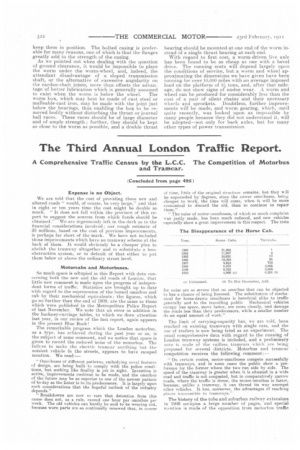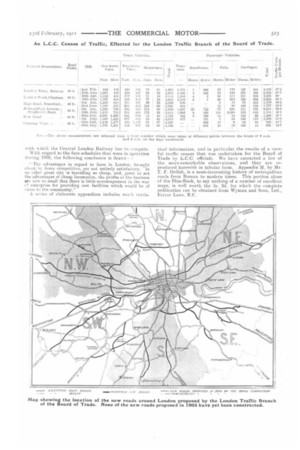The Third Annual London Traffic Report.
Page 6

Page 7

If you've noticed an error in this article please click here to report it so we can fix it.
A Comprehensive Traffic Census by the L.C.C. The Competition of Motorbus
and Tramcar.
Concluded from page 495)
Expense is no Object.
We are told that the cost of providing these new and altered roads " would, of course, he very large," and that in eight or ten years time the cost might be double as much. " It does not fall within the province of this report to suggest the sources from which funds should be obtained." We are ingenuously left in the dark as to the financial considerations involved; our rough estimate of 35 millions, based on the cost of previous improvements, is perhaps far short of the mark. We have not included those improvements which have no tramway scheme at the back of them. It would obviously be a cheaper plan to abolish the tramway altogether and to substitute a lessobstructive system, or in default of that either to put them below or above the ordinary street level.
Motorcabs and Motorbuses.
So much space is ocbipied in this Report with data con(erning both the new and the old roads of London. that little new comment is made upon the progress of independent forms of traffic. Statistics are brought up to date with regard to the supersession of the horsed omnibus and eab by their mechanical equivalents; the figures, which go no further than the end of 1909, are the same as thoso which were published in the Metropolitan Police Report of last November. We note that an error in addition in the hackney-carriage tables, to which we drew attention last year, in our review of the last report, again appears in the present Blue Book!
The remarkable progress which the London motorbus, as a type, has achieved during the past year or so, is the subject of some comment, and we notice that space is given to record the reduced noise of the motorbus. The failure to make the electric tramcar anything but the noisiest vehicle in the streets, appears to have escaped mention. We read :—
" Omnibuses of different patterns, embodying novel features of design, are being built to comply with the polies conditions, but nothing like finality is yet in sight. Invention is active, improvements continue to be made, and the omnibus of the future may be as superior to one of the newest pattern of to-day as the latter is to its predecessors. It is largely upon such considerations that the hopeful outlook of the industry depends."
" Breakdowns are now so rare that detention from this cause does not, as a rule, exceed one hour per omnibus per week. The old vehicles can hardly be said to be wearing out, because worn parts are so continually renewed that, in course
id time, little of the original sttucture remains, hut they will be superseded by degrees, since the newer omnibuses, being cheaper to work, the time will come, when it will be more economical to discard the old, than to continue to repair them."
"The noise of motor-omnibuses, of which so much complaint was justly made, has been much reduced, and new vehicles especially show a great improvement in this respect. The tests
for noise are so severe that no omnibus that can be objected to has a chance of being licensed. The substitution of mechanical for horse-drawn omnibuses is beneficial alike to traffic generally and to the travelling public. Mechanical vehicles occupy less space, move faster, are more cleanly, and damage the roads less than their predecessors, while a smaller number do an equal amount of work," Tho limit of carrying-capacity has, we are told, been reached on existing tramways with single cars, and the use of trailers is now being tried as an experiment. The usual comprehensive data with regard to the running of London tramway systems is included, and a preliminary note is amde of the railless, tramcars which are being proposed for several districts. Motorbus and tramcar competition receives the following comment:— " On certain routes, motor-omnibuses compete successfully with tramways, and in some cases the public show a preference for the former where the two run side by side. The speed of the tramway is greater when it is situated in a wide road and traffic is not congested, but in comparatively narrow roads, where the traffic is dense, the motor-omnibus is faster, because, unlike a tramway. it can thread its way amongst other vehicles. It has, moreover, the advantages of reaching places inaccessible to tramways:.
The history of the tube and suburban railway extensions in 1909 occupies a large number of pages, and special mention is made of the opposition from motorbus traffic
with which the Central London Railway has to compete. With regard to the fare schedules that were in operation during 1909, the following conclusion is drawn -•
" The advantages in regard to fares in London, brought about by fierce competition, are not entirely satisfactory. In no other great city is travelling so cheap, and, great as are the advantages of cheap locomotion, the profits of the business re now so small that there is little encouragement in the way of enterprise for providing new facilities which would be of value to the community."
A series of elaborate appendices includes much statis tical information, and in particular the results of a careful traffic census that was undertaken for the Board of Trade by L.C.C, officials. We have extracted a few of the more-remarkable observations, and they are reproduced herewith in tabular form. Appendix .11, by Mr. T. F. Ordish, is a most-intercsting history of metropolitan roads from Roman to modern times. This portion alone of tbe Blue-Book, to say nothing of a number of excellent maps, is well worth the 5s. 2d. for which the complete publication can be obtained from Wyman and Sons, Ltd., Fetter Lane, E.C.






























